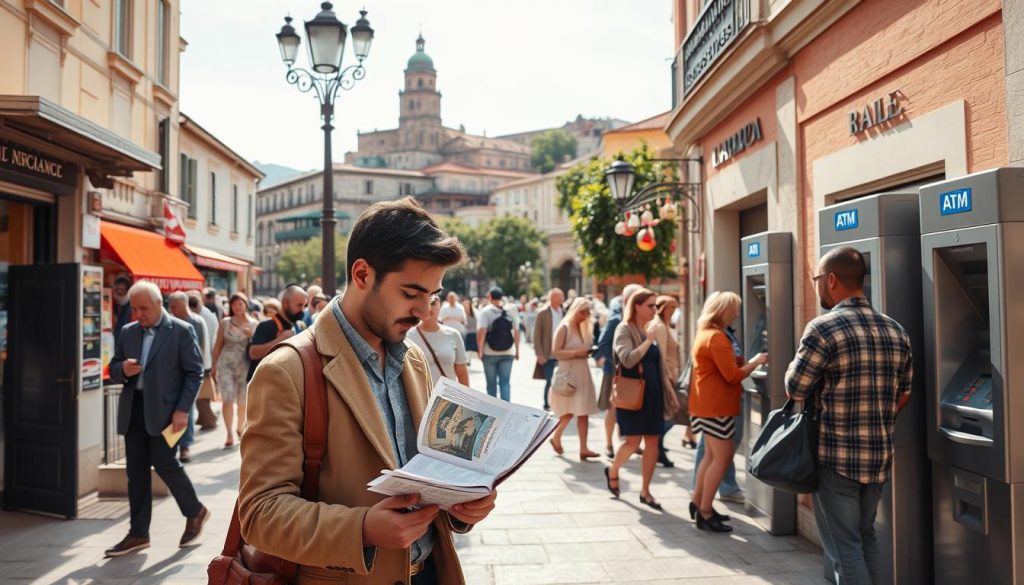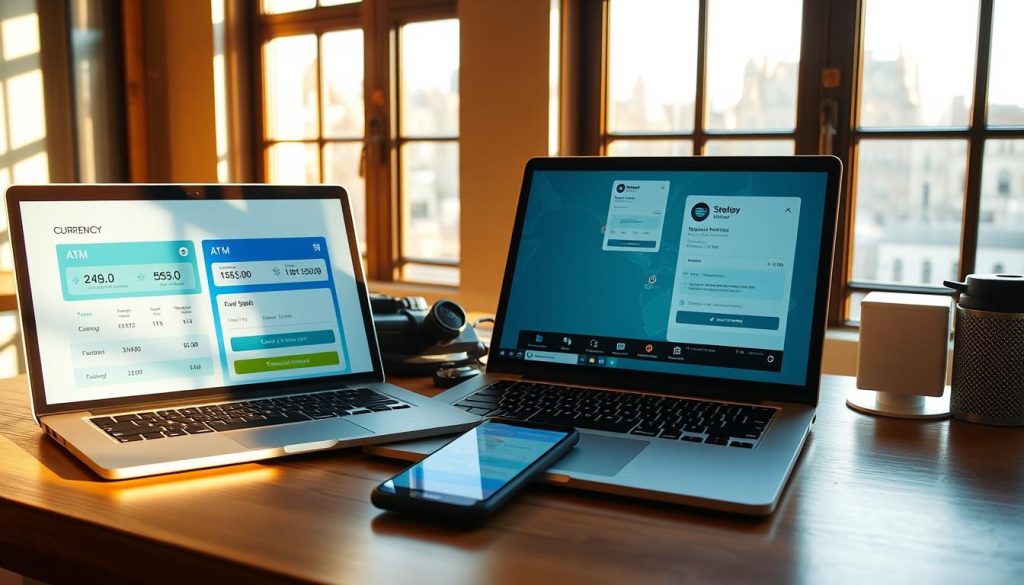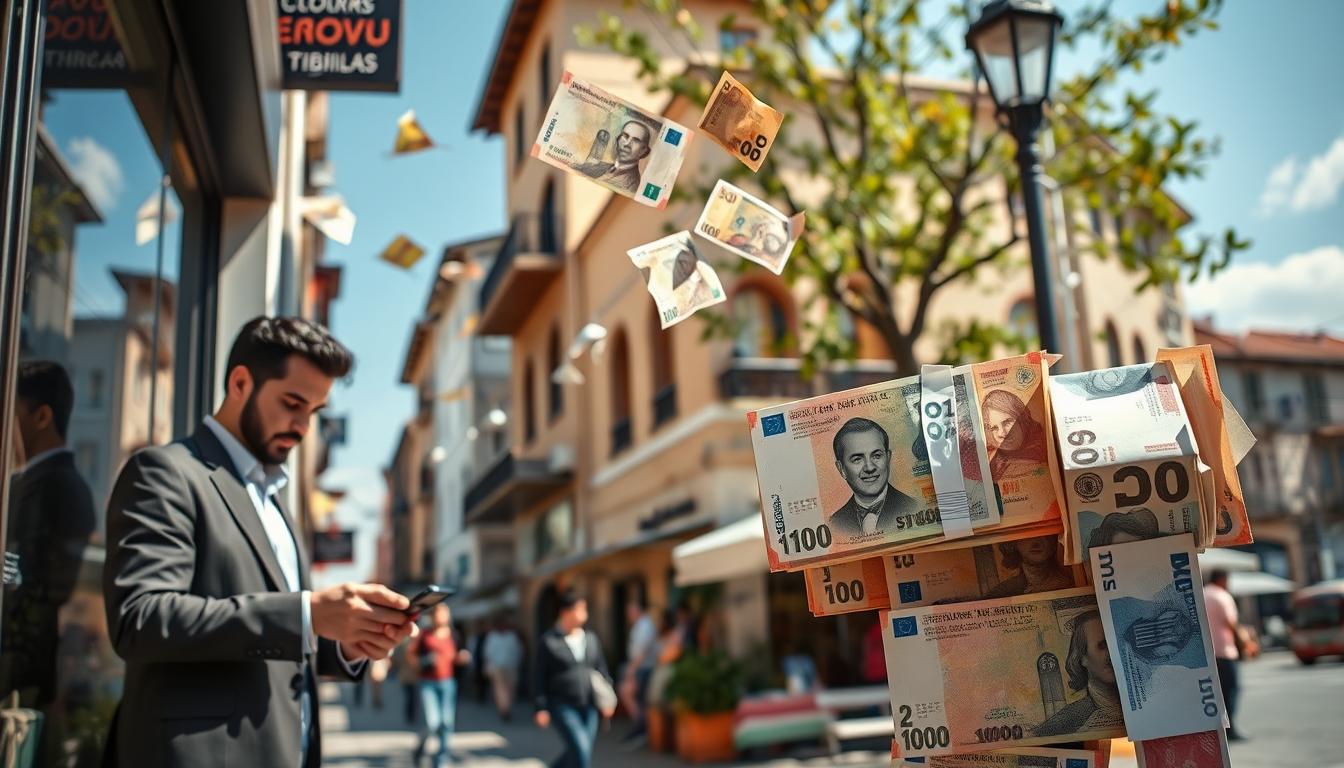✓ Accommodations ✓ Flights ✓ Rental Cars ✓ Tours & Activities
Did you know that nearly 100% of Visa card transactions in this region are contactless? This makes it a global leader in cashless payments. Understanding the local currency is key to making your trip smooth and cost-effective.
Using the Georgian Lari (GEL) for transactions helps you avoid unnecessary fees. While major cities embrace modern payment methods, rural areas often rely on cash. This guide will help you navigate ATMs, bank exchanges, and contactless options with ease.
Whether you’re exploring bustling urban centers or serene countryside, managing your money wisely ensures a stress-free adventure. Let’s dive into the essentials of handling local currency like a pro.
Introduction: Navigating Georgia’s Currency Landscape
Handling money wisely starts with knowing the basics of the GEL. The official currency, introduced in 1995, is essential for every traveler. Understanding it helps you avoid poor exchange rates and ensures safe transactions.
Payment methods in this region have evolved significantly. While cash remains common in rural areas, urban centers like Tbilisi embrace contactless options. Cards are widely accepted, making them a convenient choice for many.
Why Currency Matters on Your Journey
Knowing the GEL is more than just a travel tip—it’s a necessity. It helps you budget effectively and avoid unnecessary fees. Whether you’re shopping at local markets or dining out, using the right currency ensures smooth transactions.
Your First Steps in Georgian Transactions
Upon arrival, secure a small amount of GEL for immediate expenses. This is especially useful for taxis or small purchases. For larger transactions, consider using your card, as it’s widely accepted in cities.
This guide will walk you through everything you need to know about managing your money. From ATMs to contactless payments, you’ll be well-prepared for your adventure.
The Story Behind the Georgian Lari (GEL)
The Georgian Lari (GEL) has a rich history that reflects the country’s journey. Introduced in 1995, it replaced temporary systems and became a symbol of stability. Over time, the GEL has evolved to meet modern needs, making it a reliable currency for both locals and visitors.
History and Evolution of GEL
After gaining independence, Georgia needed a stable currency. The GEL was introduced to replace outdated systems and strengthen the economy. Its value has remained steady over time, making it a trusted choice for transactions.
Today, the GEL is widely accepted across the country. Its evolution reflects Georgia’s progress and commitment to financial stability. Whether you’re exchanging cash or using cards, the GEL ensures smooth transactions.
Design, Security Features, and Significance
The GEL’s banknotes are a blend of art and technology. They feature watermarks, holographic elements, and intricate designs that prevent counterfeiting. These security features make the GEL one of the most reliable currencies in the region.
Each banknote also highlights Georgia’s cultural heritage. From historical figures to iconic landmarks, the designs tell a story. This makes the GEL not just a currency but a piece of national pride.
| Feature | Description |
|---|---|
| Watermarks | Prevent counterfeiting and ensure authenticity. |
| Holographic Elements | Add an extra layer of security to banknotes. |
| Cultural Designs | Showcase Georgia’s history and landmarks. |
The GEL’s significance goes beyond its monetary value. It plays a vital role in the economy and is a source of pride for locals. For travelers, understanding the GEL enhances the experience and ensures seamless transactions.
Essential Currency Tips for Your Georgian Adventure
Navigating currency in a new country can be tricky, but with the right tips, you’ll master it in no time. Start by avoiding airport exchanges. These often come with higher fees and poor rates. Instead, head to banks or authorized bureaus for better deals.

Plan ahead to secure a reasonable amount of GEL for initial expenses. This is especially useful for taxis or small purchases. Blending cash and card payments ensures you’re prepared for any situation. Cards are widely accepted in cities, while cash is still king in rural areas.
Safety is key when handling money. Keep your cash in multiple places and avoid displaying large amounts in public. Use ATMs in secure locations, like banks, to minimize risks. These practical tips will make your experience as a tourist much smoother.
| Tip | Why It Matters |
|---|---|
| Avoid Airport Exchanges | Higher fees and poor rates can drain your budget. |
| Use Banks or Authorized Bureaus | Better rates and secure transactions. |
| Blend Cash and Card Payments | Ensures flexibility in urban and rural areas. |
| Protect Your Money | Minimizes risks of theft or scams. |
By following these tips, you’ll save money and enjoy a stress-free adventure. Whether you’re exploring bustling cities or serene countryside, smart money management enhances your journey.
Getting Cash in Georgia: ATMs and Exchange Options
When traveling abroad, accessing cash efficiently is crucial for a smooth experience. In this region, ATMs and exchange bureaus are your best options for obtaining local currency. Understanding how these services work will save you time and money.
ATM Withdrawals: What You Need to Know
ATMs are widely available, especially in urban areas like Tbilisi and Batumi. Most machines accept Visa, Mastercard, and Maestro cards. Some also support Union Pay. Fees for withdrawals are typically low, ranging from ₾2 to ₾3 per transaction.
It’s a good idea to withdraw larger amounts to minimize fees. However, always keep safety in mind. Use ATMs located inside banks or well-lit, secure areas. Avoid carrying large sums of cash in public.
Comparing Banks and Authorized Exchange Bureaus
If you prefer exchanging currency, banks and licensed bureaus offer better rates than airports. Bringing USD or EUR from home and converting them locally is often the most cost-effective option.
Major banks like Bank of Georgia and TBC Bank are reliable choices. Their exchange rates are competitive, and their services are secure. Licensed bureaus are also trustworthy, but always verify their credentials before proceeding.
| Option | Pros | Cons |
|---|---|---|
| ATMs | Convenient, widely available, low fees | Daily withdrawal limits may apply |
| Banks | Better rates, secure transactions | Limited operating hours |
| Exchange Bureaus | Competitive rates, quick service | Must verify legitimacy |
By choosing the right method, you can ensure you have enough cash for your trip without overspending. Whether you’re exploring cities or rural areas, these tips will help you manage your money wisely.
Embracing Card Payments and Contactless Transactions
Digital payments are transforming the way you handle transactions in this region. From bustling cities to quieter towns, the shift towards cashless methods is making travel more convenient than ever. Whether you’re dining out or shopping, using your card can save you time and money.
Visa, Mastercard, and Other Accepted Cards
Cards like Visa and Mastercard are widely accepted across the region. These are the most convenient way to pay, especially in urban areas. Some establishments also accept Maestro and Union Pay, giving you flexibility.
Before you travel, check with your bank about international transaction fees. Some banks charge a small fee for each transaction, while others offer fee-free options. This way, you can avoid unnecessary costs and manage your budget effectively.
The Rise of Contactless Payment in Urban Areas
Contactless payments are becoming the norm, especially in cities like Tbilisi. Nearly 100% of Visa transactions are now contactless, reflecting a major shift towards digital methods. This is a quick and secure way to pay for small purchases, from coffee to public transport.
While cards are widely accepted, having some local cash remains a wise backup. Rural areas may still rely on cash, so it’s best to be prepared. This ensures you’re covered no matter where your journey takes you.
“The convenience of contactless payments has revolutionized the way we travel, making transactions faster and more secure.”
| Payment Method | Benefits |
|---|---|
| Visa/Mastercard | Widely accepted, secure, and convenient. |
| Contactless Payments | Fast, secure, and ideal for small transactions. |
| Local Cash | Essential for rural areas and small vendors. |
By embracing card payments and contactless methods, you’ll enjoy a smoother travel experience. Whether you’re exploring cities or countryside, these tips will help you manage your money wisely.
Practical Strategies for Managing Money Abroad
Managing your money abroad doesn’t have to be stressful if you follow these simple strategies. Start by diversifying your payment options. Carry both cash and cards to ensure you’re prepared for any situation. Cards are widely accepted in urban areas, while cash is often essential in rural spots.

Research local banking options before you arrive. ATMs from trusted banks like Bank of Georgia and TBC Bank offer better exchange rates than currency exchange offices. Always use ATMs in secure locations to minimize risks.
Proactively avoid hidden fees by checking your bank’s international transaction policies. Some banks charge foreign transaction fees, while others offer fee-free options. This small step can save you a significant amount of money over time.
“Smart money management is the key to a stress-free travel experience.”
Keep a close eye on exchange rates and use authorized bureaus for currency conversion. Bringing USD or EUR from home and converting them locally often gives you a better chance at favorable rates. Avoid airport exchanges, as they typically have higher fees.
| Strategy | Why It Works |
|---|---|
| Diversify Payment Options | Ensures flexibility in urban and rural areas. |
| Use Trusted ATMs | Offers better rates and secure transactions. |
| Avoid Hidden Fees | Saves money on international transactions. |
| Research Exchange Rates | Maximizes your chance at favorable rates. |
By following these strategies, you’ll handle your money like a pro, no matter where your travels take you. Whether you’re exploring bustling cities or quiet countryside, these tips will keep your finances in check.
Understanding Exchange Rates and Minimizing Fees
Understanding exchange rates can save you money and make your trip smoother. The National Bank of Georgia provides daily official rates, which are essential for getting the best value. Avoid airport or hotel exchanges, as they often charge higher fees.
To minimize costs, always check the official rates before exchanging money. Use banks or authorized bureaus for better deals. Independent exchange offices may offer competitive rates, but verify their legitimacy first.
Checking Official Rates and Avoiding Excessive Fees
Start by visiting the National Bank of Georgia’s website for the latest rates. This ensures you’re informed and can spot unfair offers. For example, airport exchanges might charge up to 18% more than city options.
Here’s a quick overview of where to exchange money:
- Banks: Offer secure transactions and competitive rates.
- ATMs: Convenient but may have withdrawal limits and small fees.
- Exchange Bureaus: Often have good rates but require verification.
Using online resources or apps to monitor live rates is another smart move. Tools like Wise or XE provide real-time updates, helping you make informed decisions.
“Being informed about exchange rates ensures you get the most value for your money.”
By avoiding high-fee locations and staying updated, you can maximize your budget. This is especially important in a new country, where unfamiliarity can lead to unnecessary expenses.
| Option | Pros | Cons |
|---|---|---|
| Banks | Secure, official rates | Limited hours |
| ATMs | Convenient, low fees | Withdrawal limits |
| Exchange Bureaus | Competitive rates | Require verification |
Planning ahead and staying informed will help you avoid hidden fees and make the most of your trip. Whether you’re exchanging cash or using cards, these tips ensure a stress-free experience.
Local Payment Methods: Tips for Markets, Restaurants, and Small Businesses
Exploring local markets and dining spots can be a highlight of your travel experience. However, knowing when to use cash or cards can make your day smoother and more enjoyable. From bustling markets to cozy restaurants, payment methods vary widely, and adapting your strategy ensures a seamless journey.
Cash Versus Card: When to Use Which
In traditional markets and small eateries, cash is often the preferred payment method. Vendors may not accept cards due to high transaction fees or lack of equipment. For example, at Tbilisi’s Dry Bridge Market, cash is essential for bargaining and quick transactions.
On the other hand, restaurants and hotels in urban areas widely accept cards. Using a card here is convenient and secure, especially for larger bills. However, always carry some cash as a backup, as smaller establishments might still prefer it.
Here’s a quick guide to help you decide:
| Setting | Preferred Payment Method | Why It Works |
|---|---|---|
| Local Markets | Cash | Vendors often don’t accept cards, and cash allows for bargaining. |
| Small Eateries | Cash | Lower transaction fees and quicker processing. |
| Restaurants | Card | Convenient and widely accepted in urban areas. |
| Hotels | Card | Secure and ideal for larger transactions. |
Adapting your payment method to the locale and time of day is crucial. For instance, early morning market visits may require cash, while evening dining in the city is card-friendly. Always keep a mix of both to ensure you’re prepared for any situation.
By understanding these nuances, you’ll navigate local businesses with ease. Whether you’re shopping for souvenirs or enjoying a meal, smart payment choices enhance your travel experience.
Using Digital Tools for Currency Conversion and ATM Locators
Technology can simplify your financial decisions while traveling. With the right apps, you can monitor exchange rates, find ATMs, and save on fees. These tools are especially useful in unfamiliar places, helping you plan your moves and avoid unnecessary costs.

Recommended Apps for Real-Time Exchange Rates
Apps like Wise and XE provide live exchange rates, ensuring you get the best value. They also allow you to lock in rates for up to 96 hours, giving you time to make informed decisions. This is a great tip for avoiding sudden rate changes.
Another useful app is ATM Fee Saver. It helps locate nearby ATMs with low or no fees, saving you money on withdrawals. With over 90 countries supported, it’s a must-have for international travelers.
How to Use the ATM Fee Saver App Effectively
Start by downloading the app before your trip. Once installed, it shows ATMs in your current place, along with their fees and withdrawal limits. This helps you choose the most cost-effective option.
Here’s a quick guide to using the app:
- Open the app and enable location services.
- Search for ATMs near you or in your destination city.
- Compare fees and limits to select the best option.
By using these tools, you’ll save time and money, making your travels smoother and more enjoyable.
Cultural Etiquette and Payment Practices in Georgia
Understanding local customs can make your trip smoother and more enjoyable. In this area, tipping and payment norms are deeply rooted in tradition. Respecting these practices not only shows courtesy but also enhances your experience.
Tipping Customs and Payment Norms
Tipping is a common practice, especially in restaurants and cafes. While it’s not mandatory, it’s appreciated. In most cases, tipping is done in cash, even if you pay the bill with a card. A 10% tip is considered generous and is widely accepted.
Here’s a quick guide to tipping in different settings:
- Restaurants: 5-10% of the bill, preferably in cash.
- Taxi Drivers: Round up the fare or add a small amount.
- Hotel Staff: A small tip for housekeeping or porters is thoughtful.
Understanding Local Transaction Behaviors
In urban areas, cards are widely accepted, but cash is still king in rural spots. Markets and small vendors often prefer cash due to lower transaction fees. This is especially true in traditional bazaars, where bargaining is common.
In cities like Tbilisi, contactless payments are becoming more popular. However, carrying some cash is always a good idea. This ensures you’re prepared for any situation, whether you’re dining out or shopping at a local market.
Respecting local norms can significantly improve your overall travel experience. By following these customs, you’ll blend in seamlessly and enjoy your journey to the fullest.
How to Prepare Before You Leave: Pre-Trip Currency Tips
Planning your finances before departure can make your trip stress-free and enjoyable. Arriving with a small amount of local currency ensures you’re ready for immediate expenses like taxis or tips. This simple step can save you time and help you avoid unfavorable exchange rates at the airport.
Why Bring a Small Amount of GEL?
Having local cash on hand is especially useful for small purchases or transportation. Many foreign banks don’t stock GEL, making it harder to obtain upon arrival. By securing some beforehand, you’ll avoid unnecessary delays and fees.
Researching exchange rates before your trip ensures you get the best value. Use trusted sources like the National Bank of Georgia’s website for accurate information. This helps you avoid scams and hidden charges.
Planning Your Currency Exchange
Start by converting a small amount of your home currency to GEL before leaving. This ensures you’re prepared for initial expenses like hotel deposits or meals. Avoid airport exchanges, as they often have higher fees and poor rates.
Here’s a quick guide to pre-trip currency preparation:
| Step | Why It’s Important |
|---|---|
| Convert a Small Amount | Ensures you’re ready for immediate expenses. |
| Research Exchange Rates | Helps you avoid hidden fees and scams. |
| Use Trusted Sources | Provides accurate and reliable information. |
| Avoid Airport Exchanges | Saves money by avoiding high fees. |
Budgeting for the First Few Days
Plan your budget to cover essentials like transportation, meals, and hotel stays. Having a small amount of GEL ensures you’re prepared for unexpected costs. This also reduces reliance on atm withdrawals, which may have fees.
By taking these steps, you’ll set the tone for a smooth and enjoyable trip. Whether you’re exploring cities or countryside, smart preparation makes all the difference.
Money Matters for the Traveler: Budgeting and Safety Tips
Smart budgeting is the cornerstone of a stress-free travel experience. By planning your expenses and safeguarding your money, you can focus on enjoying your journey without financial worries. Here’s how to manage your finances effectively while exploring new destinations.
Smart Budgeting Techniques for a Stress-Free Trip
Start by creating a realistic travel budget. Include daily expenses like meals, transportation, and activities. Don’t forget to account for exchange fees and emergency funds. Using the local Georgian Lari can help you avoid unnecessary costs and get better deals.
Track your spending daily to stay on top of your budget. Apps like Wise or XE can help you monitor exchange rates and expenses. This ensures you don’t overspend and can adjust your plans if needed.

Practical Tips for Safeguarding Your Money
Safety is just as important as budgeting. Carry a mix of cash and cards to ensure flexibility. Use ATMs in secure locations and avoid displaying large amounts of cash in public. This minimizes the risk of theft or loss.
Here’s a quick guide to managing your money safely:
| Tip | Why It’s Important |
|---|---|
| Use a Money Belt | Keeps cash and cards hidden and secure. |
| Split Your Money | Store cash in multiple places to reduce risk. |
| Notify Your Bank | Avoids card blocks due to foreign transactions. |
| Carry Small Bills | Makes transactions easier and reduces exposure. |
By following these tips, you’ll ensure your money stays safe while you explore. Whether you’re in bustling cities or quiet countryside, smart budgeting and safety practices make all the difference.
Georgia (Europe): Ultimate Travelers Guide to Currencies & Payments
Efficient money management is the key to a seamless journey abroad. This guide has covered everything you need to know about handling local currency, from understanding the GEL to practical tips on cash and card transactions. By following these strategies, you’ll ensure a stress-free and enjoyable trip.
Using the local currency helps you avoid poor exchange rates and extra fees. Whether you’re withdrawing cash from ATMs or exchanging money at banks, planning ahead saves you time and money. Digital tools like currency converter apps and ATM locators can also simplify your financial decisions.
Budgeting is essential for a smooth travel experience. Track your expenses daily and allocate funds for meals, transportation, and activities. A well-planned budget ensures you don’t overspend and can enjoy your trip without financial worries.
Here’s a quick recap of the practical advice provided in this guide:
- Use local currency to avoid unnecessary fees.
- Withdraw cash from trusted ATMs or exchange at authorized bureaus.
- Blend cash and card payments for flexibility in urban and rural areas.
- Monitor exchange rates using reliable apps or the National Bank’s website.
By following these tips, you’ll handle your money like a pro. Whether you’re exploring bustling cities or serene countryside, smart financial planning enhances your journey. This guide ensures you’re well-prepared for every transaction, making your trip smooth and hassle-free.
Insider Secrets: Avoiding Payment Scams and Extra Fees
Staying vigilant about payment methods can save you from unexpected costs and scams. While most transactions are safe, it’s essential to know how to spot red flags and protect your money. Here’s how to navigate the financial landscape with confidence.
Identifying Red Flags and Scam Tactics
Scammers often target tourists with offers that seem too good to be true. For example, taxi drivers might take you to the wrong hotel to earn a commission. Always double-check addresses and agree on fares upfront to avoid such tricks.
Another common tactic involves fake police officers demanding fines. Legitimate officers will issue tickets that can be paid later. If someone insists on immediate cash payment, it’s likely a scam.
“Being informed and cautious is your best defense against financial scams while traveling.”
Verifying Legitimacy and Securing Transactions
Always use trusted banks or authorized exchange bureaus. Independent offices might offer competitive rates, but verify their credentials first. Researching usual prices and exchange rates beforehand helps you spot unfair deals.
For added security, use credit cards for larger transactions. They offer cancellation options in case of fraud. Avoid unsolicited gifts or services, as they often lead to demands for money.
| Scam Type | How to Avoid It |
|---|---|
| Fake Taxi Routes | Agree on fares and confirm destinations upfront. |
| Imposter Police | Insist on official tickets and avoid immediate cash payments. |
| Overcharging | Research usual prices and use trusted payment methods. |
By staying informed and cautious, you can enjoy your trip without falling victim to scams. Whether you’re exploring urban centers or rural landscapes, these tips ensure your money stays safe.
Where to Find Reliable Currency Exchanges and Bank Services
Finding reliable currency exchanges and bank services is essential for a smooth travel experience. Whether you’re in a bustling city or a quiet town, knowing where to go ensures you get the best rates and services.
Trusted Banks and ATM Networks
Major banks like Bank of Georgia and TBC Bank are your best options for currency exchange and ATM withdrawals. These institutions offer transparent rates and minimal fees, making them a reliable choice for travelers.
Here’s a quick overview of what you’ll find at these banks:
- Bank of Georgia: Offers competitive exchange rates and a wide network of ATMs.
- TBC Bank: Known for its excellent customer service and low transaction fees.
- Liberty Bank: Provides convenient locations and secure transactions.
Locating Authorized Currency Exchange Offices
Authorized exchange bureaus are another great option for converting your money. These offices are often found in high-traffic areas like shopping districts and near tourist attractions. Always verify their credentials to ensure you’re getting a fair deal.
Here’s how to identify a reliable exchange office:
| Feature | Why It Matters |
|---|---|
| Licensed Bureaus | Guarantees transparency and fair rates. |
| Visible Rates | Helps you compare and choose the best option. |
| Secure Locations | Minimizes risks of scams or theft. |
By using trusted banks and authorized bureaus, you’ll avoid unnecessary fees and ensure your money is safe. Whether you’re exchanging cash or withdrawing from an ATM, these tips will help you manage your finances with ease.
Conclusion
Smart financial planning ensures a smooth and enjoyable journey. By understanding the local currency and blending cash with card payments, you can avoid unnecessary fees and stay prepared for any situation. Whether you’re shopping at a market or admiring a historic banknote, these tips will help you manage your money wisely.
Thorough planning and knowledge are your best tools for avoiding scams and extra costs. Always research exchange rates, use trusted ATMs, and carry a mix of payment methods. This ensures flexibility in both urban and rural areas.
Apply these strategies to make your trip stress-free and budget-friendly. With the right preparation, you can focus on enjoying your adventure, knowing your finances are in good hands. Safe travels!
The above is subject to change.
Check back often to TRAVEL.COM for the latest travel tips and deals.






